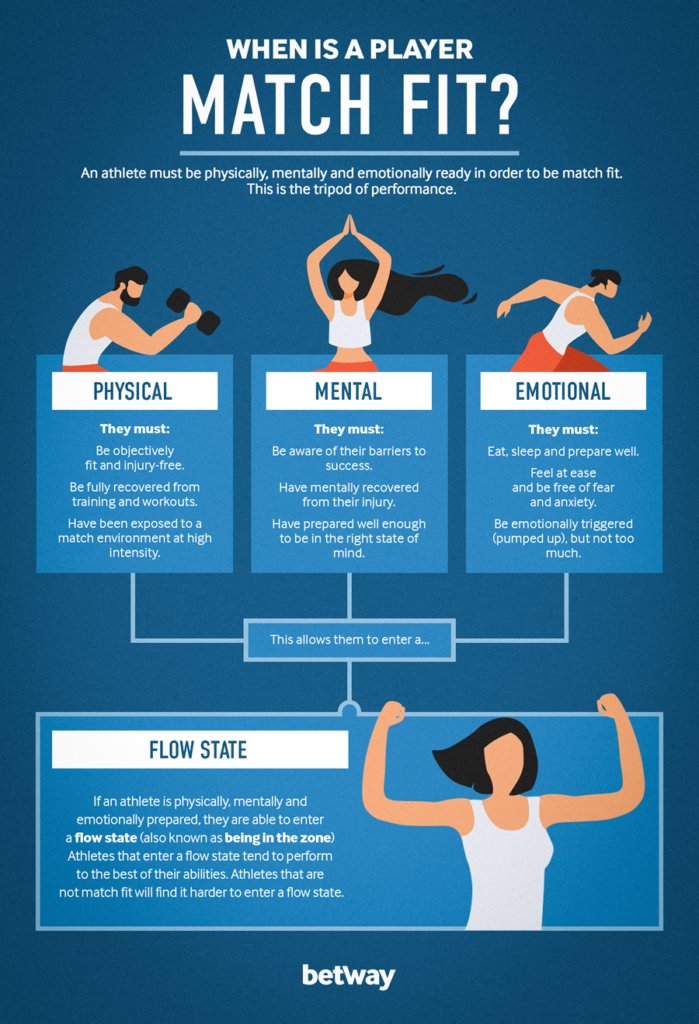As major sports leagues approach the end of their unexpected hiatus, there’s been much discussion about whether professional players are still match fit. This is a huge consideration for many clubs, as seasons could be relaunched at any moment with players having little notice to get prepared for games.
To shed some light on what staying match fit entails and why it’s important, a number of sports experts have shared their views on what needs to be considered before players are ready to play again. What they all agree on is that it’s not just about ensuring physical fitness, but also mental sharpness.
To master a degree of match fitness, each state must be fine-tuned and ready to deal with the strains placed on the others. In the high-octane world of professional sports where players must rely on split-second decision making and intuition in front of thousands of fans, there’s little room for error.
Of course, players must be secure with their emotions to be able to make the best decisions in an instant. Dan Garner, the coach of UFC champions such as Ronda Rousey and Michael Bisping, refers to the balance of the physical, mental and emotional states of being as the tripod of performance.
Physical Fitness
The physical aspect is probably the easiest aspect to understand when it comes to understanding match fitness, and perhaps one of the easiest states to maintain. According to Richard Collinge, the Head of Medical Services at West Ham United, players will be given fitness targets throughout the season that they must maintain.
These targets include everything from distances that need to be run, the heaviness of weights lifted and how many calories a player needs to burn. These factors are closely monitored and analysed over a number of seasons, and help to monitor the improving or decreasing performance of players.
This analysis extends through injuries, as players are constantly tested through rehabilitation periods to ensure that they can withstand the physical demand of the game. Additionally, coaches for international sports need to be aware of the demands of different climates.
Tumi Masekela, the strength and conditioning coach for the South Africa men’s cricket team, highlights that the new weather conditions in different parts of the world make returning to match fitness even more difficult. This is why he uses fitness baselines to decide whether or not a player is ready to play.
These are often tested in domestic or smaller games first, though it’s possible that some teams may not have the opportunity to test these aspects out before games recommence. It is clear, then, that for now the process of determining physical match fitness must rely on heavy, customised training plans and meticulous analysis by medical and coaching staff.
Mental and Emotional Fitness
There’s one key word that repeatedly came up with players discussing match fitness, and that was ‘confidence’. According to former British cricketer Kevin Pietersen, practise games were never helpful to his performance because he didn’t enjoy them. Instead, it was training hard enough to know that he was confident to win when it came to game time.
West Ham defender Ryan Fredericks agrees that confidence is everything. There’s no room for faking on a Premier League pitch, he argues. Instead, players must be secure in their ability to perform in front of a large crowd if they are to stand a chance against their opponent.
UFC coach Dan Garner believes that the ability to gauge a player’s mental capacity is what separates the good coaches from the best ones. If a player is distracted or has lost confidence, they will start making bad decisions. Additionally, if a player lacks the mental stamina to continue, they won’t be ready to play.
In order to ensure psychological fitness, coaches will encourage clear dialogue. This allows them to track players’ mental states and ensure they aren’t falling into negative thinking patterns. Coaches also encourage players to work on their mental health by self-analysing.
Once coaches have a clear understanding of their players’ mental states, they can analyze upcoming games to ensure players are being scheduled correctly. The challenge for fitness coaches is knowing how to encourage struggling players to keep pushing, and knowing when to stop.
The Flow State
As the experts at Betway put it, the mastering of the physical, mental and emotional challenges of being an athlete results in a so-called flow state. This state, also called being in the zone, is the prime mode of Being for players on the field.
This blend of confidence, alertness and physical robustness takes years to perfect and requires constant observation and refinement. To be match fit is to be able to slip into this flow state at will, and is the key factor in separating the regular team from the champion team.


